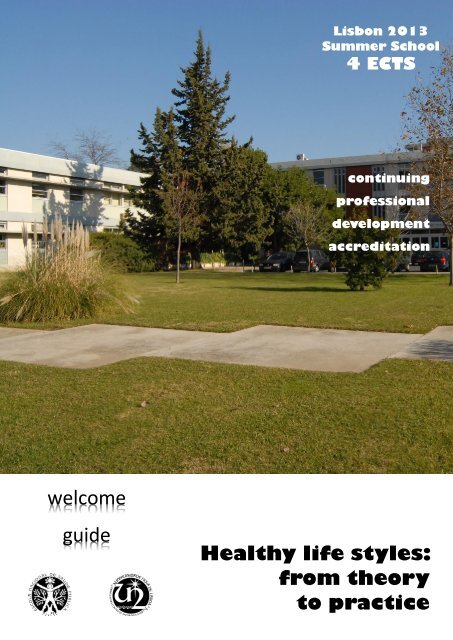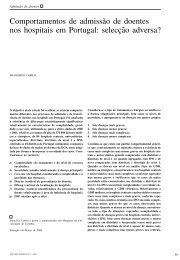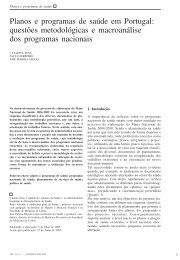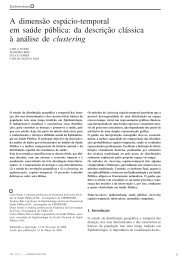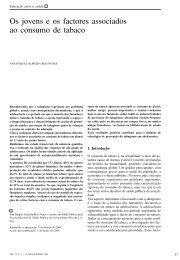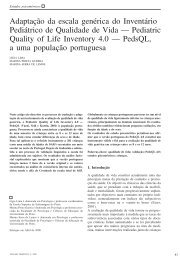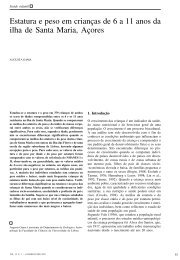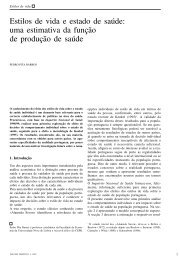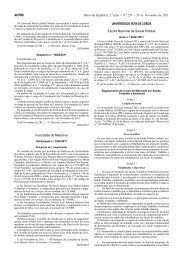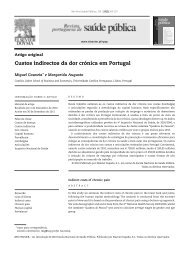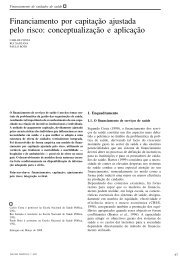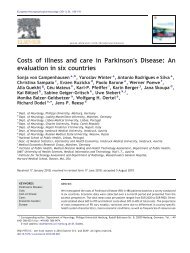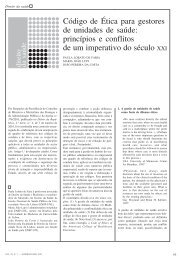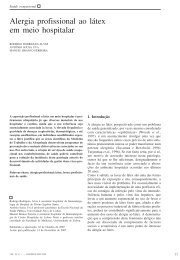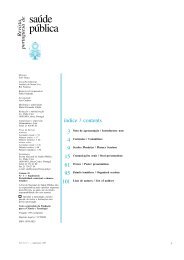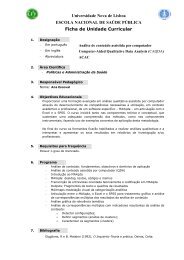welcome guide - Escola Nacional de Saúde Pública
welcome guide - Escola Nacional de Saúde Pública
welcome guide - Escola Nacional de Saúde Pública
Create successful ePaper yourself
Turn your PDF publications into a flip-book with our unique Google optimized e-Paper software.
Lisbon 2013<br />
Summer School<br />
4 ECTS<br />
continuing<br />
professional<br />
<strong>de</strong>velopment<br />
accreditation<br />
<strong>welcome</strong><br />
<strong>gui<strong>de</strong></strong><br />
Healthy life styles:<br />
from theory<br />
to practice
Welcome note<br />
2
Table of Contents<br />
Welcome note ..................................................................................................................... 2<br />
Introduction ......................................................................................................................... 4<br />
Application and Enrolment ................................................................................................... 5<br />
Useful Information ............................................................................................................... 5<br />
Stu<strong>de</strong>nt Assessment ............................................................................................................. 6<br />
Language (Lectures and Courses) ......................................................................................... 6<br />
Welcome Session ................................................................................................................. 6<br />
Summer School objectives ................................................................................................... 6<br />
Program ............................................................................................................................... 7<br />
Teaching methodology ......................................................................................................... 8<br />
Certificate ............................................................................................................................ 9<br />
Accommodation ................................................................................................................... 9<br />
Supporting Services .............................................................................................................. 9<br />
Insurance ........................................................................................................................... 10<br />
Other Useful Information ................................................................................................... 10<br />
Checklist ............................................................................................................................ 11<br />
ENSP Location .................................................................................................................... 12<br />
3
Introduction<br />
<strong>Escola</strong> <strong>Nacional</strong> <strong>de</strong> Saú<strong>de</strong> Pública (ENSP) provi<strong>de</strong>s postgraduate<br />
teaching and research in health related areas,<br />
namely in public health and health policy and<br />
management.<br />
Established in 1966, ENSP is a pioneer institution in<br />
public health education in Portugal and in Europe. The<br />
school was incorporated in NOVA in 1994.<br />
With an experienced and competent faculty, ENSP<br />
invests in health promotion and innovation, through a<br />
broad network of national and international<br />
partnerships. Its goals are:<br />
• To promote a stu<strong>de</strong>nt-oriented teaching/learning<br />
process with an integrated, and dynamic vision of<br />
health systems and Public Health sciences;<br />
• To promote scientific discovery, knowledge<br />
production and innovation practices in Public Health;<br />
• To connect research and teaching with action in<br />
Public Health, in or<strong>de</strong>r to establish itself as an effective<br />
influence in the emerging knowledge society.<br />
Faculty at ENSP cover many different disciplines such as<br />
Epi<strong>de</strong>miology and Statistics, Environmental and<br />
Occupational Health, Health Promotion, Health Policy,<br />
Management of Healthcare Organizations, Health<br />
Economics, Sociology of Health and Health Law.<br />
ENSP receives annually about 170 new stu<strong>de</strong>nts for<br />
courses with one or more years duration, including<br />
doctorates, masters and specializations. Additionally,<br />
about 200 other stu<strong>de</strong>nts attend short courses. Master<br />
and PhD theses and other final course dissertations are<br />
often published in scientific journals. ENSP stu<strong>de</strong>nts<br />
have diverse educational backgrounds, which inclu<strong>de</strong><br />
medicine, nursing, pharmacy, health technologies,<br />
economics, management, law, psychology and others.<br />
The School provi<strong>de</strong>s relevant services to the<br />
community, including public and private institutions<br />
who seek its faculty and researchers to support the<br />
resolution of specific problems of health and health<br />
care in Portugal. Several professors and graduates<br />
occupy important positions in the health system.<br />
In addition to protocols and agreements<br />
established with its peers both nationally and<br />
internationally for the <strong>de</strong>velopment of studies<br />
and projects in the area of Public Health, ENSP is<br />
a member of several important associations in<br />
the health field.<br />
The School has its own facilities at Lumiar, with<br />
a<strong>de</strong>quate resources for the stu<strong>de</strong>nts to <strong>de</strong>velop<br />
their studies and learning experience. <strong>Escola</strong><br />
<strong>Nacional</strong> <strong>de</strong> Saú<strong>de</strong> Pública also has easy access by<br />
various means of transport.<br />
Address<br />
Avenida Padre Cruz<br />
1600-560 Lisboa<br />
www.ensp.unl.pt<br />
Tel. : +351 217512100 | Fax : +351 217582754<br />
E-mail : ensp@ensp.unl.pt<br />
4
Application and Enrolment<br />
Procedures<br />
Before Departure<br />
How to apply<br />
A stu<strong>de</strong>nt who wishes to attend<br />
courses, must submit the Application<br />
Form to ENSP-UNL, through the ENSP-<br />
UNL home page, together with the<br />
specified documents<br />
1 ID Card/Passport<br />
2 Passport photos<br />
Deadlines for Applications:<br />
31th may<br />
Upon Arrival<br />
Registration<br />
After arrival in Lisbon the stu<strong>de</strong>nt<br />
must go to the ENSP-UNL campus to<br />
register. After this procedure the<br />
Course Office will issue a stu<strong>de</strong>nt<br />
card. With this card and a password<br />
obtained in the Computer and<br />
Network Services the stu<strong>de</strong>nt can<br />
access the ENSP-UNL moodle platform<br />
which contains useful aca<strong>de</strong>mic<br />
information. This card is also nee<strong>de</strong>d<br />
to benefit from the facilities at ENSP-<br />
UNL.<br />
Useful Information<br />
The ECTS Credits and Grading Scale<br />
A full-time stu<strong>de</strong>nt will gain 4 credits from the course. The ECTS credit system is based on study<br />
workload, which inclu<strong>de</strong>s contact hours and the number of hours <strong>de</strong>dicated to completing papers,<br />
internships, projects, study and evaluation (preparing for examinations). Typically, one ECTS<br />
represents 28 hours of study (including class attendance). The ENSP-UNL grading system is based<br />
on a mark between 10 (minimum to pass) and 20 (maximum).<br />
5
Course fee:<br />
ENSP stu<strong>de</strong>nt: €320<br />
ENSP alumnus: €420<br />
Stu<strong>de</strong>nt elsewhere: €520<br />
Alumnus elsewhere: €620<br />
Stu<strong>de</strong>nt Assessment<br />
System assessment for the course will inclu<strong>de</strong> written and oral<br />
presentations.<br />
Language (Lectures and Courses)<br />
Lectures in the Course are given in English in classes<br />
with international stu<strong>de</strong>nts.<br />
Welcome Session<br />
Newly arrived stu<strong>de</strong>nts are <strong>welcome</strong> to a reception organized by the ENSP-UNL. Events you<br />
shouldn’t miss. Welcome session (July 15, 8 a.m.) — organised by the course coordination<br />
Outdoor Challenge (July 15 - 19) — organised by the Stu<strong>de</strong>nt Support Unit<br />
Summer School<br />
objectives<br />
At the end participants should have<br />
acquired skills to help improve healthy<br />
lifestyles (of an individual or group of<br />
people) by<br />
– Un<strong>de</strong>rstanding the evolution of<br />
health paradigms with their context<br />
within the concept of "quality of<br />
life", taking into account theoretical and empirical improvements concerning healthy life<br />
styles<br />
– Characterize attitu<strong>de</strong>s and behaviors that promote healthy life styles (HLS)<br />
– Help improve levels of HLS<br />
– Clarify and sustain scientific references and technical capabilities to analyze, evaluate and<br />
use concepts of HLS while implementing methodologies to address them<br />
– With a research-action-validation-dissemination strategy of best practices, strength an<br />
agenda of knowledge translation about the know-how of HLS<br />
6
– Develop skills of un<strong>de</strong>rstanding the context and cultural sensitivity to the needs of<br />
different groups of people within the HLS approach<br />
– Develop strategies to empower citizens to carry out healthy choices<br />
– Apply innovative methods to promote healthy lifestyles<br />
– Promote cooperative learning & change life activities<br />
– HLS mo<strong>de</strong>ling, impact assessment and social influence/change triggering HLS<br />
sustainability<br />
Program<br />
<br />
<br />
<br />
<br />
<br />
"Lifestyle and health” (HLS) concept evolution: from pathogenesis to salutogenesis<br />
Explanatory mo<strong>de</strong>ls for the origin and maintenance of health (eg socio-ecological<br />
mo<strong>de</strong>l) and integration of comprehensive approaches for HLS (eg "renasceres®");<br />
resilience and health <strong>de</strong>terminants<br />
Lifestyles theory (e.g. Belloc and Breslow) health literacy, social learning and selfhealth<br />
management<br />
Environments sustainability, causal and contributory factors: behavior change and<br />
social marketing (e.g. exercise and physical activity)<br />
Nutrition, survival and hedonism: nutritional reference. The holism issue, Sobel and<br />
WHO and HLS<br />
– Causal (e.g. water profile and hydration) and contributory factors and health <strong>de</strong>terminants<br />
(e.g. sun and vitamin D)<br />
7
– Confi<strong>de</strong>nce, Equilibrium/Balance and Rest: social stress expertise and resistance resources in<br />
HLS promotion<br />
– Social geography and epi<strong>de</strong>miological distribution of lifestyles trends. Healthy lifestyles in<br />
the midst of a crisis; promotion of individual and community empowerment<br />
– Susceptibility, the Sense of Coherence and General Resources of Resistance in promoting<br />
HLS<br />
– Environment, community health and HLS<br />
Teaching methodology<br />
– The teaching methodology is varied and seeks to promote an active and<br />
participatory learning environment. Reading of fundamental texts is required and<br />
discussion of topics or exercises occurs regularly.<br />
– Sessions will begin with a presentation by a teacher, followed by a discussion of<br />
topics related to the subject un<strong>de</strong>r examination where stu<strong>de</strong>nts are encouraged<br />
to intervene.<br />
– Some sessions will be more practical with problem solving tasks, presentation of<br />
results and discussion of implications for health systems management. The<br />
seminars consist of group work with the presence of a teacher, which <strong>de</strong>velops<br />
in-<strong>de</strong>pth discussion of the topics in the syllabus.<br />
– Assessment of commitment, work and participation (20%), ma<strong>de</strong> through<br />
observation of stu<strong>de</strong>nt participation and the presentation and discussion of<br />
8
topics and exercises in sessions and 40% in group activities. Individual evaluation<br />
(40%) is targeted with questions <strong>de</strong>aling with the topics taught.<br />
– Assessment of commitment, work and participation (20%), ma<strong>de</strong> through<br />
observation of stu<strong>de</strong>nt participation and the presentation and discussion of<br />
topics and exercises in sessions and 40% in group activities. Individual evaluation<br />
(40%) is targeted with questions <strong>de</strong>aling with the topics taught.<br />
Certificate<br />
after successful completion of<br />
studies a final electronic<br />
certificate is issued in English.<br />
Accommodation<br />
Stu<strong>de</strong>nts should could apply to SAS<br />
since ENSP-UNL cannot guarantee<br />
accommodation for international stu<strong>de</strong>nts. Meals are not inclu<strong>de</strong>d. Hotels, private houses or<br />
hostels are possibilities to find accommodation. Stu<strong>de</strong>nts can rent a room in a private home or<br />
an apartment and share with other colleagues. A room in a private home costs between 50<br />
and 150 € per night. An apartment with dining room, kitchen, bathroom and 2 rooms can cost<br />
around 500 € / 750 € per month. An apartment of this type can be shared with 3 other<br />
stu<strong>de</strong>nts. A list of addresses can be provi<strong>de</strong>d.<br />
While you are looking for a place to live you may stay a couple of days at a Youth Hostel<br />
(www.hostelworld.com) or at Alfama Patio Hostel (www.flash-hostels.com; contact:<br />
alfamapatio@flashtravellers.com)<br />
Supporting Services<br />
Health Insurance and Visa Don’t Forget: Entry and Resi<strong>de</strong>nce Regulations: Foreign stu<strong>de</strong>nts<br />
wishing to enter and stay in Portugal must go to a Portuguese Consulate / Embassy in their own country<br />
and fill in a form indicating the purpose of their stay and their address (when available) in Portugal.<br />
Stu<strong>de</strong>nts must submit notice of approval and the period for which the internship is taking place. More<br />
information can be obtained from Portuguese Embassies and Consulates<br />
(http://www.mne.gov.pt/mne/pt/infocidadao/pestrangeiro/embaixadas/) or from the Ministry of<br />
Internal Affairs (Serviço <strong>de</strong> Estrangeiros e Fronteiras, Ministério da Administração Interna -<br />
http://www.sef.pt).<br />
9
Insurance<br />
The stu<strong>de</strong>nt must check the personal insurances policies before leaving the native<br />
country. It is very important to bring:<br />
• health insurance<br />
• liability insurance<br />
EU citizens - European stu<strong>de</strong>nts can obtain the European Health Insurance Card. They<br />
should contact the sickness insurance institution to which they are affiliated. For more<br />
information:<br />
http://ec.europa.eu/employment_social/healthcard/in<strong>de</strong>x_en.htm.<br />
Non-EU citizens - the stu<strong>de</strong>nt must check with his/her<br />
medical assistance services which documents are required to<br />
receive assistance in Portugal<br />
Other Useful Information<br />
The Cost of Living (in €): Living expenses vary according to personal lifestyle and choice of housing.<br />
On average, 600,00 € per month is required to face the basic expenses:<br />
10
Meals: There is a stu<strong>de</strong>nts' canteen facility<br />
placed at ground level of the ENSP-UNL where<br />
lunch is served for about 7 € per meal.<br />
The timetable is:<br />
Lunch - from 11:30 to 14:30<br />
Dinner - from 18:00 to 20:30<br />
Other meals can be obtained in the various<br />
snack bars available where full meals should<br />
not cost more that 10,00 €. There are some<br />
fast food restaurants near by as well as lowpriced<br />
restaurants.<br />
Breakfast, in Portugal, normally takes<br />
place between 07:00 and 10:00 and<br />
consists of milk and/or coffee and<br />
toast or bread. In Portugal coffee is<br />
normally “espresso” type, called<br />
“bica” in Lisbon or “cimbalino” in<br />
Porto. Lunch is usually a full meal,<br />
including soup, fish or meat and<br />
<strong>de</strong>ssert, with a coffee at the end.<br />
Most people have lunch between<br />
12:00 and 15:00. Around 17:00, most<br />
people have a light snack and a coffee or milk. Dinner is also a full meal, like lunch, served<br />
between 20:00 and 22:00.<br />
Checklist<br />
Tick the box once you completed the task:<br />
Before Departure: before coming be sure that:<br />
you have sent to ENSP-UNL the application form duly filled in together with the rest of<br />
documents required<br />
you bring the confirmation that you have been accepted by ENSP-UNL<br />
you bring your Health European Card and liability insurance certificates<br />
you bring your national i<strong>de</strong>ntity card (EU stu<strong>de</strong>nts) and passport (non-EU stu<strong>de</strong>nts)<br />
you bring some money<br />
you bring about 4 photos for documents<br />
Upon Arrival<br />
Register at the International Office (ENSP-UNL)<br />
Contact your Aca<strong>de</strong>mic Coordinator (through ENSP-UNL)<br />
We wish you a pleasant and safe stay in Lisbon!<br />
11
ENSP Location<br />
Carris: Autocarro nº 747 - paragem<br />
Av. Rainha Dona Amélia<br />
Carris: Autocarro nº 767-<br />
paragens junto às bombas da BP<br />
Mais informações em www.carris.pt<br />
Estação do Campo Gran<strong>de</strong><br />
Estação <strong>de</strong> Telheiras<br />
12
Have a question not answered before? Send us an e-mail to summer-school@ensp.unl.pt<br />
We are happy to assist you!<br />
www.ensp.unl.pt<br />
Tel. : +351 217512100 | Fax : +351 217582754<br />
E-mail : summer-school@ensp.unl.pt<br />
13


